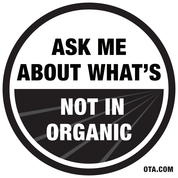March 19 the Swette Center welcomed Gary Hirshberg, who gave a great presentation on what to expect from the next generation of organic food. As expected, Hirshberg wowed our audience with facts about organic agriculture and engaged us in a discussion about why organic matters. Among other things, he shared with us the recent ad campaign organized and sponsored by the Organic Trade Association that highlights 700 synthetic ingredients prohibited in organic food: http://bit.ly/notinorganic.
This is a very quick post to share excellent coverage of the event by The Hagstrom Report (reprinted with permission). Hear Hirshberg's remarks from the event on YouTube.
The Hagstrom Report | Wednesday, March 20, 2019 | Volume 9 Number 62
Hirshberg: ‘Facts’ about conventional foods do not disparage them
Agriculture Secretary Sonny Perdue has told organic producers they should not disparage conventional foods, but Gary Hirshberg, the co-founder of Stonyfield Farm, the largest producer of organic yogurt, said Tuesday that telling consumers organic foods do not contain the 700 chemicals in conventional foods is not disparaging the competition, just presenting the facts.
“I don’t think we should be disparaging. I think we should speak with facts,” Hirshberg said as he pointed to an ad that showed a list of chemicals and the phrase “Skip this ridiculously long list of chemicals and just go organic.”
A variation of the ad said, “Over 700 reasons to just go with organic.” The ads feature the USDA Organic seal.
Hirshberg made the remarks when The Hagstrom Report asked him what he thought about Perdue telling the conventional corn, wheat, soybean and sorghum farmers at the Commodity Classic in Orlando, Fla., in February that he had told organic industry leaders they should not disparage foods produced conventionally.
Hirshberg spoke in Washington Tuesday at an event titled “Get Ready for the Next Generation of Organic” at the Arizona State University Swette Center for Sustainable Food Systems.
There is conflict within the organic food industry, with some organic producers maintaining that organic food must be produced and sold by small operations.
But Hirshberg said, “I have come to terms with what is called selling out.” He added, “I have shelved my own rebellious instincts in favor of market dominance.”

Hirshberg said Stonyfield was the first organic company to sell to Walmart and that he “took grief from the left in New England for selling out to big bad Walmart.”
“Organic never set out to be food for the elite,” he said.
Kathleen Merrigan, the executive director of the center who wrote the organic standards act when she was an aide to Sen. Patrick Leahy, D-Vt., and later served as Agriculture deputy secretary, said she agreed.
“I am not appalled at having Walmart sell organics,” Merrigan said.
Hirshberg and Merrigan agreed that they both approve of organic aquaponics — produce grown in water — even though some purists maintain that organic food must be grown in soil.
Hirshberg seemed to delight in the battle between organics and conventional foods for market share. He noted that organics are growing in grocery store sales while many conventional foods are flat or declining. Organic consumers are presumed to be white and upper income, but Hirshberg said the gowth in organics last year was led by Hispanic consumers.
Millenial consumers, he said, don’t have as much money, but they are buying more organic fruits and vegetables, which are lower in cost, and less meat and dairy items, which are more expensive.
Among millenial consumers, Hirshberg said, the trends are based on “absolute distrust of institutions,” including both government and companies, confusion due to the proliferation of labels such as fair trade and reenerative, and millienials’ “absolute confidence that they can get information from their fingertips.”
The last, Hirshberg said, is a problem because the information on the Internet “is not always reliable.”
For all consumers, he said, “concern about chemicals in the food supply has never been greater.” That concern is growing as the Environmental Working Group and others publish reports showing the presence of glyphosate in oats and beer, pesticides in strawberries and insecticides in children’s urine, he said.
Consumers are worried that “exposure to pesticides in the womb can affect children’s brains” and that working in conventional agricultural fields or even near them “can affect people,” he said.
As a business person, Hirshberg said, his obligation is “to make sure I am balancing the benefits to the farmer and the consumer.”
Stonyfield is paying farmers twice the price for milk that conventional farmers get, he said, and has a “long list” of conventional dairy producers who would like to convert to organic.
But Hirshberg said he can’t promise to buy from them because organic dairy products, while growing, are growing slower than the rest of the organic food sector. The biggest reason for the shift to plant base foods is concern about animal welfare, he said.
In a jab at a competitor, Hirshberg said that conventional farmers who are selling to Chobani and other competitors are getting such low prices that they are living off their assets and not painting their barns.
The organic business is getting harder because there is an “explosion of venture capital” in the sector, Hirshberg said.
“Some valuations are absurd,” he said, noting that Lactalis, a French-based dairy multinational, paid “twice revenues” to buy Stonyfield, which had earlier been acquired by Groupe Danone, another French company.
For the future, Hirshberg said, the organic industry needs to keep standards high to maintain consumer confidence. The 2018 farm bill will help discourage imports of animal feed that is falsely labeled as organic, but the origin of livestock rule and the pasture rule need to be better enforced while the organic livestock and practices rule that the Trump administration withdrew “needs to come back,” he said.
He noted that the 2018 farm bill also increased the budget for organic research, which he said is vital to proving what organic agriculture can do.
Hirshberg also said growers and companies need to support the voluntary checkoff, and he urged the industry to support the next generation of farmers, noting Stonyfield’s backing of the Wolf‘s Neck Farm, a training center.
Hirshberg said the single biggest need is consumer education because there is so much confusion over the proliferation of labels.
But Hirshberg said he is not worried about competition from foods labeled “local.”
Noting that he has operations in New Zealand, Hirshberg said. “I live and grow in many bioregions. Is it a competitor? I don’t think so. Where possible, do both.”

